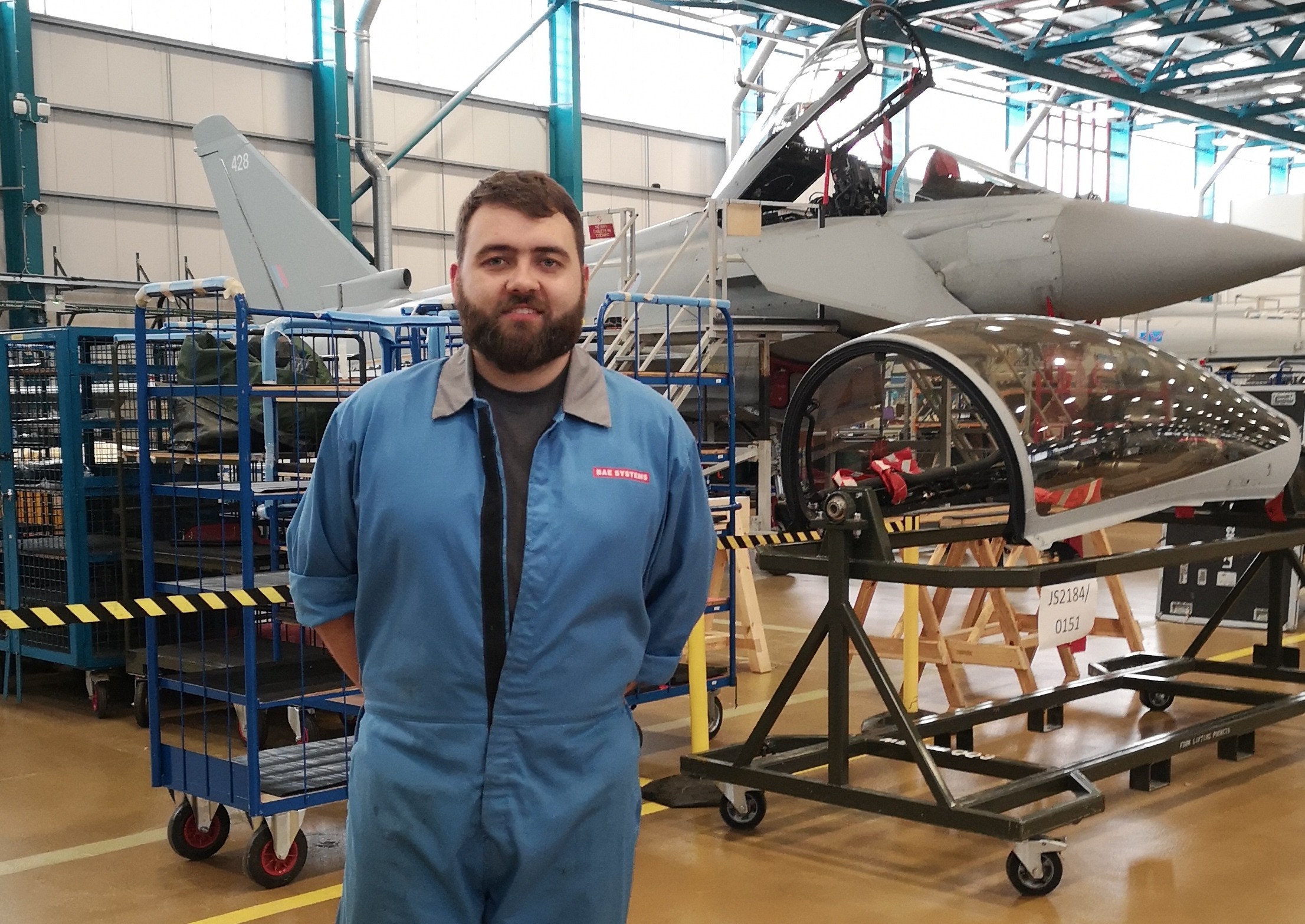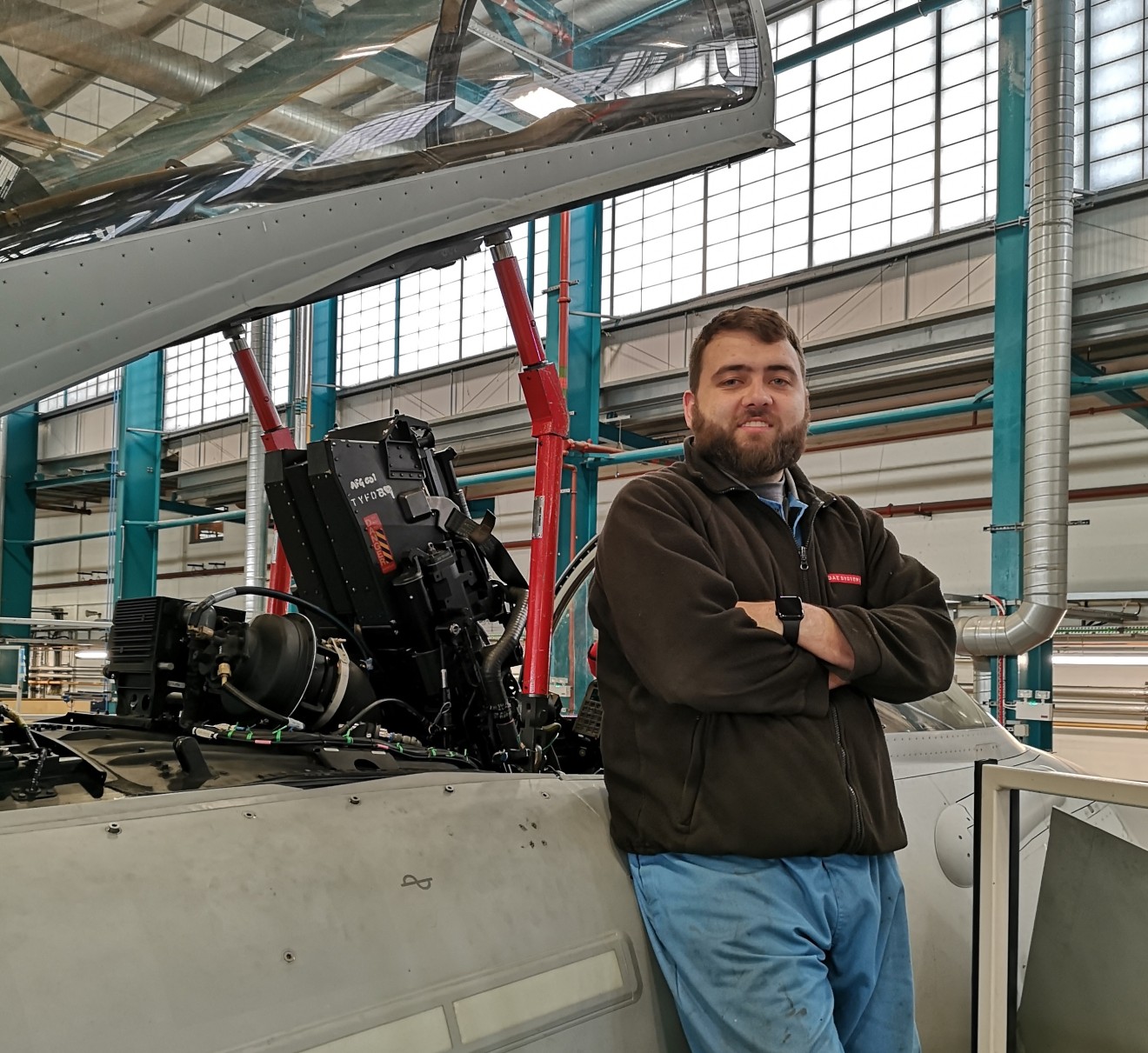Tell us about your early career?
I joined BAE Systems as an 18 year old apprentice at its Aircraft Maintenance Academy at Robin Hood Airport in South Yorkshire in March 2010. I did my initial first year training there and moved to RAF Coningsby to start my Level three NVQ in aircraft maintenance.
Following that I worked here at theTMU as a mechanical operator. In March 2015 I went on secondment to the Kingdom of Saudi Arabia and worked alongside the Royal Saudi Air Force for a year and a half.
I then returned to Coningsby and did a little bit of training work, supporting new apprentices that were coming through from the academy, before moving back to the shop floor and I’m now a senior supervisor.
What sparked your interest in a career in this industry?
I’ve always had a general interest in aviation, mainly fighter jets, from being a young boy. I’m from Lincolnshire, the county has a rich aviation heritage and I would look forward to my uncle taking me up to RAF Waddington, He’d take his camera and we’d sit there in a little car park with my brother and cousin just watching the different aircraft flying over us. RAF Scampton was also nearby, so we’d see the Red Arrows flying on a daily basis. It was all very inspiring.
Who has encouraged you during your career?
It’s cliché but my Mum and Dad, they were in very different sectors compared to me, but their dedication to their respective jobs in Childcare and the Power Grid Sector was always inspiring.
Then there are people I work with now. They have helped me develop to a point where I'm working at the same level as them from a hierarchy perspective. So, it's nice for me to be working alongside people that I looked up to for so long. I'd like to think it's nice for them to see me get to that position as well.
What are the key skills you need for your role?
Communication is critical. You need to be able to talk to people, whether that be the people that you're working with in any job you’re doing or whether it’s liaising with other agencies to source spare parts or technical advice.
You need a logical and analytical mind to be able to look at things simply and figure out, if you've got a problem, and where it could lie. That feeds in massively when you get issues in testing phase of the aircraft servicing.
As I’ve moved up in my career I’ve learned the importance of interpersonal skills, especially when you are carrying out line management and being responsible for a team day to day regardless of how many people that may be.
Good time management is also essential. Making sure you give everyone enough time to carry out their tasks and then managing that accordingly across all the people you've got.

What kind of challenges or pressures does the role bring?
A major one is the need to be able to adapt. You may plan something, but 14 aircraft can go through this building at any one time, and although different aircraft are at different phases of their maintenance, you're going to hit times when everyone’s trying to do the same thing. So, it is about being adaptable. You may get to a point where you need to say, ‘Okay we can’t do that today, so we’ll do this instead.’ It’s about keeping what other things you can be doing in the back of your mind in case your plan for the day doesn’t quite work out.
Everyone at this point in time is striving for efficiency, we’re always looking to do things in the most efficient way we can. However, at the end of the day, the main thing for us all is safety. Everything we do is ‘safety first’ before we look at anything else. When you've got control surfaces and landing gear moving around under high pressure hydraulics, there's a lot that can go wrong if you're not careful. So, we will always err on the side of caution and place safety first.
How does it feel being part of the wider Eurofighter programme?
I’ve got a lot more insight now into the wider Eurofighter world that exists in my current role, than when the only thing I use to worry about when I came to work was doing the job that I’d been given that day. When we hear things that are happening in the other nations that operate Typhoon we learn from them as well.
Working side by side with your RAF colleagues, do you feel part of that mission?
It gives us a good appreciation of the work we carry out. We know that at the moment they are flying the aircraft more than any other nation. One of the reasons they can do what they're doing is because of what we do. For us, it is about getting the aircraft out with the best capability so it can go and do the job it does.
What does a typical day look like for you?
There isn’t really a typical day. The aircraft that come in could be with us for anything up to six months, so no day is ever going to be the same. I look to get in early before the shift starts so I can see what needs to be done and plan what the team will be doing for the day so I can brief them on their tasks. Being in a senior supervisory role it is having that bit of foresight. I’m in a team of four or five.
At the end of a shift, I've got a nice almost hour-long commute so I can decompress in the car on the way home. I’m fortunate that it would be difficult for me to take my work home because my drive isn’t big enough to fit an aircraft, so keeping a good work life balance is fairly easy!
